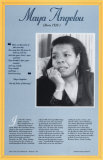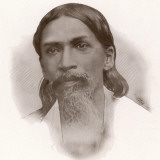|
|
|
Stephen Ambrose
b. 1-10-1936; Lovington, IL
d. 10-13-2002; Washington, DC
History professor Stephen Ambrose was the biographer of Dwight D. Eisenhower and Richard Nixon as well as a best selling author of books like Band of Brothers.
Stephen Ambrose quotes ~
• “As to the Indians, the guiding principle was, promise them anything just so long as they get out of the way.”
• “Dams have harmed our wildlife and made rivers less useful for recreation.”
• “History is everything that has ever happened.”
• “I was taught by professors who had done their schooling in the 1930s. Most of them were scornful of, even hated, big business.”
• “I'm no politician. I'm an historian who has learned through a lifetime of studying that nothing in the world beats universal education.”
|
|
|
|
|
Maya Angelou
b. 4-4-1928; Missouri
Maya Angelou - poet, writer, performer, teacher, director, civil rights activist and author of six bestselling autobiographies and collections of poetry and essays, has been the Reynolds Professor of American Studies at Wake Forest University in North Carolina since 1981.
• more Maya Angelou posters
|
|
|
|
Susan B. Anthony
b. 2-15-1820; Adams, MA
d. 3-13-1906
Noted civil rights activist and suffragist Susan B. Anthony worked as a teacher to help pay her family's debts after the “Panic of 1837”; she then protested that male teachers earned four times more than the women teachers, for the same duties.
Susan B. Anthony quotes ~
• “It would be ridiculous to talk of male and female atmospheres, male and female springs or rains, male and female sunshine.... how much more ridiculous is it in relation to mind, to soul, to thought, where there is as undeniably no such thing as sex, to talk of male and female education and of male and female schools.”
• “If all the rich and all of the church people should send their children to the public schools they would feel bound to concentrate their money on improving these schools until they met the highest ideals.”
• “Sooner or later we all discover that the important moments in life are not the advertised ones, not the birthdays, the graduations, the weddings, not the great goals achieved. The real milestones are less prepossessing. They come to the door of memory unannounced, stray dogs that amble in, sniff around a bit and simply never leave. Our lives are measured by these.”
|
• Great Women posters
• more Susan B. Anthony posters
|
|
|
|
Thomas Aquinas
b. c. 1225; Naples, Italy
d. 3-7-1274; France
Thomas Aquinas was a Dominican priest, philosopher, and the foremost classical proponent of natural theology in the scholastic tradition. His professor, Abertus Magnus said of him, “We call him the dumb ox, but in his teaching he will one day produce such a bellowing that it will be heard throughout the world.”
Known as Doctor Angelicus, Doctor Universalis and Doctor Communis, he was the father of the Thomistic school of philosophy and theology which integrated Christian doctrine with elements taken from the philosophy of Aristotle. Aquinas' Summa Theologica is considered second to the Bible in importance to the Catholic Church.
Thomas Aquinas quotes ~
• “It is requisite for the relaxation of the mind that we make use, from time to time, of playful deeds and jokes.”
• “Wonder is the desire for knowledge.”
• “Love takes up where knowledge leaves off.”
• “The things that we love tell us what we are”
• “A man has free choice to the extent that he is rational.”
• “How is it they live in such harmony the billions of stars – when most men can barely go a minute without declaring war in their minds about someone they know?”
• “Because philosophy arises from awe, a philosopher is bound in his way to be a lover of myths and poetic fables. Poets and philosophers are alike in being big with wonder.”
|
|
|
|
|
Aristotle
c. 384 BC-322 BC; Greece
If you ever wonder if teachers have any effect take a look at Aristotle, one of the founders of Western philosophy, and teacher of Alexander the Great, Ptolemy and Cassander at the royal academy of Macedon. Alexander created one of the largest empires in ancient history (from the beginning of recorded human history until the Early Middle Ages); Ptolemy, the trusted general of Alexander, became ruler of Egypt; and Cassander, the founder of the Antipatrid dynasty.
Aristotle quotes on Education ~
• “The roots of education are bitter, but the fruit is sweet.”
• “One must learn by doing the thing, for though you think you know it, if you have no certainty until you try.”
• “It is the mark of an educated mind to be able to entertain a thought without accepting it.”
• “Education is the best provision for the journey to old age.”
• “We are what we repeatedly do.”
|
• more Aristotle posters
|
|
|
|
Henry Edward Armstrong
b. 5-6-1848; London, England
d. 7-13-1937
Chemist Henry Armstrong is best remembered for his work on teaching science. Armstrong is the namesake for fornaphthalene-1,5-disulfonic acid (Armstrong's Acid), and for recognizing that affinities have direction and are not merely point particles.
Henry Edward Armstrong quote ~
• “... Talking will not make teachers – little more than the mere tricks of the trade will be learnt in the practicing school: real teachers will only arise when the training given in such as to develop thought-power and some understanding of the art of experimental inquirey.” - Papers on Education
|
|
|
|
William H. Armstrong
b. 9-14-1911; near Lexington, Virginia
d. 4-11-1999; Kent, Connecticut
Children's author and educator William H. Armstrong is best known for his 1969 Newbery Medal-winning novel, Sounder.
• dog posters
|
|
|
|
Thomas Arnold
b. 6-13-1795; Isle of Wight
d. 6-12-1842; heart attack
Historian and educator Thomas Arnold is best remembered for the reforms he initiated as head master of Rugby School from 1828-1841 and as a character in Tom Brown's Schooldays, a novel by Thomas Hughes.
Thomas Arnold was the father of poet Matthew Arnold and Mary Augusta Arnold who published novels as Mrs Humphry Ward. Another daughter, Julia, married Leonard Huxley, the son of Thomas Huxley and their sons were Julian and Aldous Huxley.
Thomas Arnold quotes on Education ~
• “Real knowledge, like everything else of value, is not to be obtained easily. It must be worked for, studied for, thought for, and, more that all, must be prayed for.”
• “The difference between one man and another is not mere ability, it is energy.”
|
|
|
|
|
Roger Ascham
c. 1515; Yorkshire, England
d. 12-23-1568
Scholar and didactic (instructional) writer Roger Ascham is noted for his prose style in promotion of the vernacular, and his theories of education.
He acted as tutor to the future Elizabeth I in Greek and Latin, and served in her administration.
Roger Ascham quotes on Education ~
• “Chide not [the pupil] hastily; for that shall both dull his wit, and discourage his diligence; but [ad]monish him gently; which shall make him both willing to amend and glad to go forward in love and hope of learning.”
• “In mine opinion, love is fitter than fear, gentleness better than beating, to bring up a child rightly in learning.”
• “Learning teacheth more in one year than experience in twenty.”
• “The least learned, for the most part, have been always most ready to write.”
|
• A Memoir of Roger Ascham / With an Introduction by James H. Carlisle
|
|
|
|
Sri Aurobindo
née Aurobindo Ghose
b. 8-15-1872; Calcutta (now Kolkata), India
d. 12-5-1950; Pondicherry (Puducherry), French India
Sri Aurobindo is best remembered today as a philosopher, yogi, and guru (teacher) for his vision of human progress and spiritual evolution. As a young man he joined the Indian movement for freedom from British rule and became one of its most important leaders. When Gandhi asked him to become the spiritual leader of India, he declined, saying he was concerned for the whole world.
His teaching are expressed in the founding of Auroville “an international township endorsed by UNESCO to further human unity near the town of Pondicherry, which was to be a place ‘where men and women of all countries are able to live in peace and progressive harmony above all creeds, all politics and all nationalities’”.
FYI - Margaret Wilson, the daughter of Woodrow Wilson, visited Pondicherry in 1938 and lived there for the rest of her life.
|
|
|
|
Avicenna (Ibn Sina)
b. c. 980; present day Uzbekistan
d. c. 1037; Iran
Persian Ibn Sina, the foremost physician of his time and considered a father of early modern medicine as well as “the most famous scientist of . . . all races, places, and times.”
Known as Avicenna in the West, he was a polymath - learned in astronomy, chemistry, Hafiz (completely memorized the Quran), logic, mathematics, poetry, philosophy, psychology, physics, science, theology, a Sheikh (elder), soldier, statesman, and maktab (Arabic word for elementary school) teacher.
Avicenna, writing that children can learn better when taught in classes instead of individual instruction from private tutors, said that competition and emulation among pupils, as well group discussions and debates, were useful.
Avicenna quotes ~
• “The world is divided into men who have wit and no religion and men who have religion and no wit.”
• “Now it is established in the sciences that no knowledge is acquired save through the study of its causes and beginnings, if it has had causes and beginnings; nor completed except by knowledge of its accidents and accompanying essentials.”
|
|
|
|















